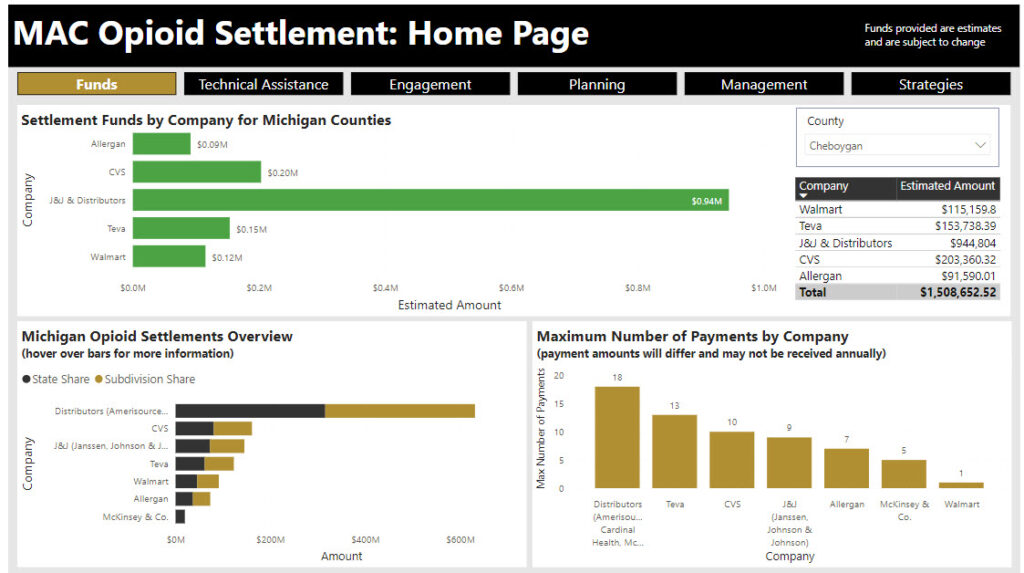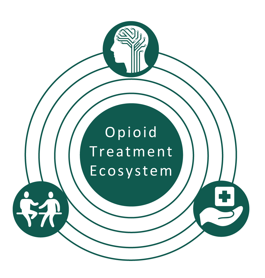MAC-backed juvenile justice package begins legislative journey
 A package of 20 bills to reform the state’s juvenile justice system, supported by MAC, was introduced in the House this week and referred to the chamber’s Criminal Justice Committee.
A package of 20 bills to reform the state’s juvenile justice system, supported by MAC, was introduced in the House this week and referred to the chamber’s Criminal Justice Committee.
The package, House Bills 4624–4643, is a result of the Michigan Task Force on Juvenile Justice Reform’s recommendations provided last July.
The Task Force on Juvenile Justice Reform was established by Gov. Gretchen Whitmer in 2021. The bipartisan task force was chaired by Lt. Governor Gilchrist and included members from all three branches of government, as well as state and local level juvenile justice leaders and advocates. Two county commissioners served on the Task Force, each nominated by MAC. Alisha Bell of Wayne represented a county commissioner from a county with a population over 100,000, and Marlene Webster of Shiawassee represented a county commissioner from a county under 100,000 in population. Rep. Sarah Lightner, a former county commissioner, also served on the Task Force.
The Task Force discovered several challenges to strengthening public safety and improving outcomes for youth. Those challenges, however, led to the set of 32 recommendations last year. Six priority areas have been identified and translated into this 20-bill package.
HB 4624, by Rep. Christine Morse (D-Kalamazoo), enhances the Child Care Fund (CCF) by establishing a minimum framework of juvenile justice best practices statewide, including the use of risk screening and assessment tools. The best practices will be supported by an increase in the reimbursement rate for community-based services from 50 percent to 75 percent. These changes are essential to ensure counties have the resources to implement and utilize these approaches.
(UPDATE: Please see clarification on CCF rate changes in the Aug. 25, 2023, Legislative Update.)
HBs 4625–4629 require the consistent use of validated screening and assessment tools to enable more objective decision-making and allow agencies to better match youth to appropriate supervision and services, reducing their likelihood to recidivate. The bills also expand the Diversion Act so that all offenses, with an exception for youth committing a specified juvenile violation, are eligible for pre-court diversion, based on the use of a risk-screening tool and other factors and limit the time that a youth can be placed on pre-court diversion, unless the court determines that a longer period is needed. While diversion eligibility would be expanded, judicial discretion remains.
HBs 4630 and 4631, by Rep. Lightner (R-Jackson), would expand the Michigan Indigent Defense Commission to include development, oversight, and compliance with youth defense standards in local county defense systems, and expands the State Appellate Defender Office to include appellate services for juveniles.
HBs 4634–4637 eliminate most non-restitution fees and costs associated with juvenile justice system involvement. The bills do not include the elimination of restitution or fees related to the Crime Victims Fund. For restitution and fees related to the Crime Victims Fund, the bills establish a standard procedure for ability to pay, determination of payment schedule, and total to be assessed.
HBs 4638–4642 would strengthen and expand the Office of the Children’s Ombudsman for handling, investigating, and reporting incidents in juvenile facilities.
A committee hearing is expected in the coming weeks, as well as the introduction of this bill package in the Senate.
MAC supports this package and has shared a letter of support with members of the House Criminal Justice Committee.
For more information on this issue, contact Samantha Gibson at gibson@micounties.org.
MAC releases Opioid Settlement Dashboard
 MAC has officially released an Opioid Settlement Dashboard on the Opioid Settlement Resource Center webpage. The dashboard includes six pages of information about current funds and county readiness for spending.
MAC has officially released an Opioid Settlement Dashboard on the Opioid Settlement Resource Center webpage. The dashboard includes six pages of information about current funds and county readiness for spending.
The home page looks at settlement funds, highlighting the maximum number of payments per company, state and local shares, reporting requirements and, most importantly, allows counties to use a dropdown menu to see their estimated total amounts of funds per settlement.
The technical assistance page provides a map of counties that are engaged with MAC specifically for technical assistance related to settlements and highlights when these requests occurred.
Four additional pages utilize data from the Opioid Settlement Baseline Assessment to illustrate county plans for stakeholder engagement, county planning, management of funds and monitoring of funds and activities.
Since many counties are still in the planning phases, the dashboard points to three areas where additional information will be added in the future: areas of investment, links to public-facing plans and reports as well as additional monitoring.
For more information on MAC’s opioid settlement resources, contact Amy Dolinky at dolinky@micounties.org.
Podcast 83 episode reviews budget, juvenile justice news
 Legislators have enough money to pass a fiscal 2024 budget that includes significant increases in county revenue sharing and in reimbursements from the Child Care Fund, among other county priorities, MAC’s Podcast 83 team reported this week.
Legislators have enough money to pass a fiscal 2024 budget that includes significant increases in county revenue sharing and in reimbursements from the Child Care Fund, among other county priorities, MAC’s Podcast 83 team reported this week.
Host Stephan Currie and Deena Bosworth, Madeline Fata and Samantha Gibson of MAC’s Governmental Affairs Team reviewed a variety of positive developments for counties in recent days:
- State budget: The Consensus Revenue Estimating Conference, held May 19, showed that legislators have the resources to spend at least $14 billion in the General Fund, which is good news for revenue sharing, among other items.
- Revenue sharing: Bosworth reported great process on MAC’s Revenue Sharing Trust Fund project, a joint effort with local governments, to create a dedicated fund, backed by a percentage of sales tax revenues, for revenue sharing.
- Juvenile justice: Gibson reported on a 20-bill package filed in Lansing to enact a wide variety of MAC-supported recommendations from a state task force that studied improvements for the juvenile justice system.
- Statewide septic code: Fata reported on the expected filing of legislation to enact a statewide septic code and MAC’s ongoing review of that legislation.
View the full video of the episode, recorded on May 22, by clicking here.
Previous episodes can be seen at MAC’s YouTube Channel.
And you always can find details about Podcast 83 on the MAC website.
Webinar will focus on Opioid Settlement Exhibit E and allowable uses
 On June 8, the second webinar in the Opioid Settlement Technical Assistance Learning Series will be held from 2:30 p.m. to 3:30 p.m. (EST), providing a discussion on Exhibit E. The series is hosted by the Michigan Department of Health and Human Services, in partnership with Michigan State University, University of Michigan and Wayne State University as part of their Technical Assistance Collaborative.
On June 8, the second webinar in the Opioid Settlement Technical Assistance Learning Series will be held from 2:30 p.m. to 3:30 p.m. (EST), providing a discussion on Exhibit E. The series is hosted by the Michigan Department of Health and Human Services, in partnership with Michigan State University, University of Michigan and Wayne State University as part of their Technical Assistance Collaborative.
The webinars are intended to provide information from experts for officials and representatives from counties, municipalities and townships, including community members, to aid in their opioid settlement investment processes. This webinar, titled “Overview of the Opioid Settlement and Discussion on Exhibit E,” will focus on allowable uses of funding. See the flier and register by clicking “Register Today.”
For more information on opioid settlements are technical assistance, contact Amy Dolinky at dolinky@micounties.org.
 MAC offices closed on Memorial Day
MAC offices closed on Memorial Day
MAC’s offices in Lansing will be closed on Monday, May 29 in observance of Memorial Day.
Normal office hours will resume at 8 a.m. on Tuesday, May 30.
 Staff picks
Staff picks
- NACo forms Exploratory Committee on Artificial Intelligence (NACo News)
- Paths to new prosperity and a better politics in our democracies (Our Towns Civic Foundation)
- Remote work pays off for Travis County, Texas (NACo News)
- Man steals backhoe for 10-mile drive to Illinois airport to catch flight (Associated Press)
